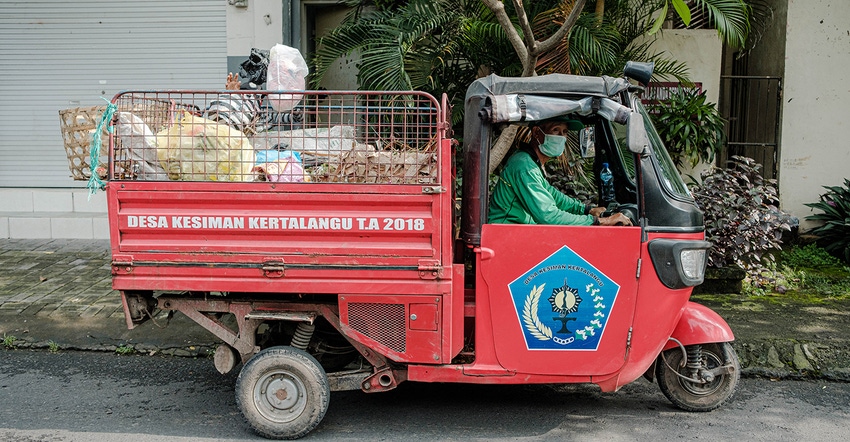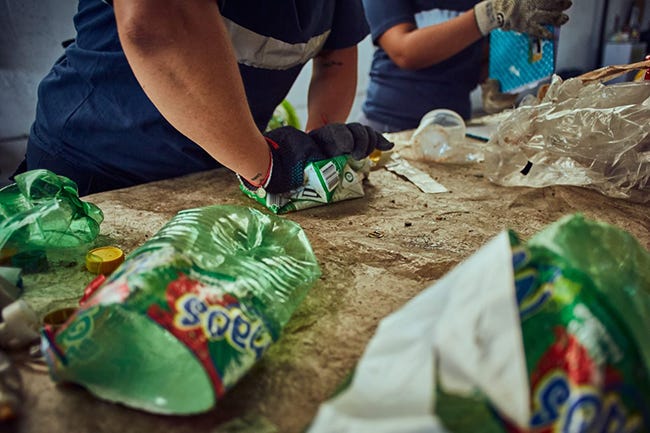Global Plastics Treaty Must Treat Waste Pickers Fairly, Says Delterra
The environmental NGO calls for a “just transition” to a formal waste system that prioritizes workers’ rights alongside material recovery.
July 24, 2023

While 1,700 delegates from almost 170 countries agreed in May to develop a first draft of what could become a global treaty to reduce plastic waste by the end of 2024, one NGO is working to make sure that the waste workers at the ground level of recycling are treated fairly.
“The Global Plastics Treaty represents an unparalleled opportunity to address the world’s plastic waste problem,” said Chenxin Venable, Knowledge & Strategy Associate at Delterra, an international environmental non-profit organization. “As governments negotiate, waste workers have been organizing and advocating for their inclusion in what negotiators call a ‘just transition’ — a formal waste system that prioritizes waste workers’ rights alongside material recovery.”
Venable said that Delterra’s ongoing work with waste workers shows that fair wages and safe working conditions can dramatically improve workers’ lives while also improving the quality and quantity of recyclables recovered.
“The ‘just transition’ is not just a nice-to-have; it will be essential to the design of any successful treaty,” Venable said.
First draft in the works
The May meeting in Paris ended with a mandate for the Intergovernmental Negotiating Committee secretariat to prepare a first draft of an agreement, called a “zero draft,” before the INC-3 meeting in Nairobi, Kenya, in November. The zero draft will include submissions from member governments and other stakeholders on elements not covered during the INC-2 meeting in Paris. The draft would present a legally binding plastics treaty.
The rules of procedure — whether passing the agreement will require a two-thirds majority vote or be approved by consensus — was a contentious issue during the first two days of INC-2 in Paris. This was not resolved and will be discussed later. Also unresolved is how to enforce the agreement if some countries or participants do not abide by it.
The Business Coalition for a Global Plastics Treaty said it was encouraged that more than 130 member states have specifically called for binding rules that will create a level playing field for all businesses. “We believe that legally binding global rules and harmonized policies are critical to drive change at a global scale to end plastic pollution," the coalition said.
Waste workers vs. waste pickers
Waste workers are people employed in the waste sector, often through formal organizations such as municipalities, co-operatives, and private companies. Waste pickers refers to informal waste workers, including those living on dumps, under indentured servitude, or picking recyclables out of bins.
“These waste pickers are the most marginalized groups globally and face a number of human rights abuses, negative health outcomes, and poor social-economic conditions,” Venable said. “Despite waste pickers numbering over 20 million, they have largely existed in the shadows and have struggled to advocate for their rights or get proper recognition. Lately, there are positive signs that things are changing.”
For example, the International Alliance of Waste Pickers is a growing network of waste picker organizations, representing groups in dozens of countries covering Latin America, Asia, and Africa. Women in Informal Employment Globalizing and Organizing also is advocating for more rights for these informal workers, Venable said.
Fair Circularity Initiative recruits consumer brands
“These organizations and others were represented at INC-1 and INC-2, and there is specific recognition for addressing informal sector workers in the options paper and expected to be in the zero draft,” Venable said. “The Fair Circularity Initiative is convening consumer goods brands to abide by a set of principles on human rights and informal waste workers.”
In Argentina and other parts of Latin America, informal waste workers have come together to create formalized cooperatives that collaborate with cities to operate waste management and recycling facilities. Venable said Delterra works closely with many cooperatives and sees the value of an employee-owned model, where these workers receive fair wages, benefits, and are incentivized to collect and sell more recycled materials.
Formalization improves waste workers’ lives
Delterra said its work improves waste workers’ lives through formalization: It provides workers in the informal waste sector with a formalized job and training, improving their income, benefits, and working conditions.
|
Fair wages and safe working conditions can dramatically improve waste workers’ lives while improving the quality and quantity of recyclables recovered, according to environmental NGO Delterra. |
“This is one aspect of our work to transform the waste management system in communities,” Venable said. “In Indonesia, for instance, Delterra is working with local governments to run sorting centers known as TPS3Rs. These offer a stable income to local workers but also improve the quality and quantity of recyclables recovered by collecting recyclables regularly in conjunction with a Delterra program that educates households on why it’s important to separate their waste.
“On average, it takes us less than a year to help a sorting center run profitably, and waste workers can see up to a 200% increase in their pay as a result of Delterra’s commitment to pay all workers at least minimum wage, which is initially subsidized by Delterra and then made possible by the ongoing running of the operations,” Venable said. “Delterra’s Indonesia operations currently include 146 waste workers across seven locations. Some workers in Indonesia live onsite at the centers and improving conditions there drastically improves their quality of life. Meanwhile, we’re recovering hundreds of tons of waste that would otherwise go to a landfill. The expertise of our waste workers is what makes these sorting centers run smoothly, so these workers have to be trained and paid accordingly.”
About the Author(s)
You May Also Like





